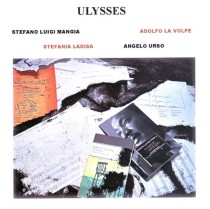ULYSSES
Stefano Luigi Mangia (voice, alto sax, toys)
Stefania Ladisa (violin, toys, voice)
Adolfo La Volpe (acoustic and electric guitars, harmonium, electronics, banjo, cetera corsa, voice)
Angelo Urso (double bass, toys, voice)
Tracklist: PLAY
1-Impro#1 2:30
2-Stratosfonie [to Demetrio Stratos] (music S.L. Mangia / lyrics John Cage) 8:55
3-Impro#2 3:01
4-Impro#3 2:45
5-Aforisma-LDV [to Leonardo da Vinci] (music S.L. Mangia / lyrics Leonardo da Vinci) 0:59
6-Composizione in 48 cm [to Fedor Dostoevskij] (music Stefania Ladisa) 6:06
7-1969 [ to A. Einstein] (music Angelo Urso) 1:14
8-Mlk [to Martin Luther King] (music S.L. Mangia) 3:30
9-Cada Jardyn Solo [to J.L. Borges] (music Adolfo La Volpe / lyrics J.L.Borges) 5:31
10-Impro#4 3:42
11-Perfetta Letizia [to San Francesco] (music Stefania Ladisa) 1:45
12-La virtù temporale [to Kurt Gödel] (music Adolfo La Volpe) 1:13
13-Ulysses [to Ulysses] (music and lyrics S.L. Mangia) 6:24
Total Time: 47:37
Recorded and mixed by Adolfo La Volpe at Adhil Studio, Ceglie del Campo (Bari, Italy), February-April 2011; cover concept by Stefano L. Mangia and Valentina Serra; inner sleeve photo by Valentina Serra; produced by Ulysses and Leo Feigin.
Special thanks to: Alessandro Zignani, Valentina Serra, Valerio Daniele, Pierpaolo Martino.
Liner Notes:
THE FORMULA OF A DREAM
Music deals with archetypes: represents universal models which are deep-rooted in our subconscious. Music is, therefore, a grammar of the collective imagination: fed of myths. A myth is an event that, if told, changes back to a dream. Writing music, at the dawn of the new millennium, means organizing one’s traces of memory according to recurring dreams. The interior recurrences of Ulysses’ theme in this concept album become topographies of the personality; something similar to what Joyce tried to do with Ulysses: the story of a man who, dreaming of being someone else, travels in the imagination of every person he meets. The authors of this Ulysses, likewise, let their associative memory be permeated with filaments of contemporary myths, sonic biographies of travellers to whom can be applied Machado’s definition: “no hay caminos, hay que caminar”.
The first connotation common to all mythopoeic symbols -the “heroes” of the album- is to be travellers of the impossibile, explorers of limits. This goes for Kurt Gödel, whose theorem proved that mathematics is an art, not a science; for Martin Luther King, promoter of the paradoxical fight against human urges which is nonviolence; and moreover, Leonardo da Vinci: theorist of the microcosm-man (the “pentalpha”), in whose proportions reflects the Harmonia Mundi; Jorge Luis Borges, who structured the subconscious as a library; St Francis of Assisi: saint, paradoxically, for his pagan pantheism; Fëdor Dostoevskij: the enlightened psychologist of the holy epilepsy; Albert Einstein, who made Physics a discourse upon the wrong perception of the world, destroying, in fact, Humanism; lastly, Demetrio Stratos, who set music’s regeneration to the inaccessible border between sound and breath. Each one of these characters-symbols is evoked according to different aptitudes: practices of the instrumental tradition rethinked, and turned over in its sign; textual fragments that are more echoes of his voice, than “discourses”; canons between different stylistic traits drawn from his imaginative world or, more, alienating forking paths: between music and lyrics, sign and meaning. The underlying idea is to trace a map of what remained active in our dreams of the universalistic utopia radiated along the twentieth century from the voyage’s archetype.
Ulysses, therefore, is a diagram of the crisis, but also a reconnaissance from on high of the possible routes; as a matter of fact, freedom is always a trauma.The more interesting element of the project is the geometric nature of compositive Forms. Comes to mind that weird novel upon a bidimensional world that is Flatlandia by E.Abbott; in the same way, in Ulysses we find pieces made up of millimetric recursive sequences (space-time continuum) next to others that replicate wrapping around themselves, like Möbius’strips; specular structures inverted, where the perspective is multifocal, in a Escher’s fashion, along with others modular, fragmented, like figures in a dream repeating night after night, without reaching an end, for the premature awakening. It has to do, in essence, with a new conception of “counterpoint”: here, a way to link heterogeneous experiences without reducing them to a code. In default of a new Humanism’s grammar, writing music means, in our times, favouring phenotype over genotype: the testimony of a detachment between the vision of the world, that explains, and the sensation, that renews the mistery.
Ulysses is therefore useful as a map of the present times: and the map, as Wittengstein said, isn’t the territory. In theimprovisations that mark the border between project and adventure, intellectual itinerary and mystical excessus mentis, we find the Modernity’s refugees that made Ulysses, this album-diaspora, who compare what of their works is rhizome and spore, alchemic substance of every possible permutation.Such esotericism of the imagination represents a very rare stylistic trait in the contemporary musical landscape. Alchemy means art of the least transition between contiguous states of the matter; in music, a sort of quintessential purification of an old practice: Variation. One of the alive ferments of the album indeed, is old Forms resurfacing as traces of memories: remembrances of legendary travellers of whom we heard, in the dawn of conscience, the heroic deeds.
The poetics of the fragment, the tapestry of quotation: all that which the already mentioned Borges believed to be the only possible structural evidence, in the contemporary imagery, becomes here a landscape of ruins, where the footsteps of the witnesses are more important than the pillars that support the arches.Gods, in us, have become feelings, states of mind; Forms have transformed in oneiric mythologies.Luigi Dallapiccola conceived the lyrics for his Ulisse, secret fetish of a concept album, like a collage of sentences, jokes, remnants of life found on the walls of the stations he travelled across.Ulysses, that fired in him the associative memory. By different roads, this Ulysses also proceeds along the same poetics; only, the passing of time has modified the geosyncline of the landscape: now, is a regression to the amniotic state, the Eden-like purity of every larval becoming. A moment of albedo, of magma coming to life, this Ulysses: something similar to that combinatorial machine that Mallarmè theorized, when he predicted that the new poets would have been keepers of time, cartographers of remote experiences, not theoreticians of sterile algorithms.For always in music every Orpheus that turns back is looking for a new Eurydice.
Alessandro Zignani.













